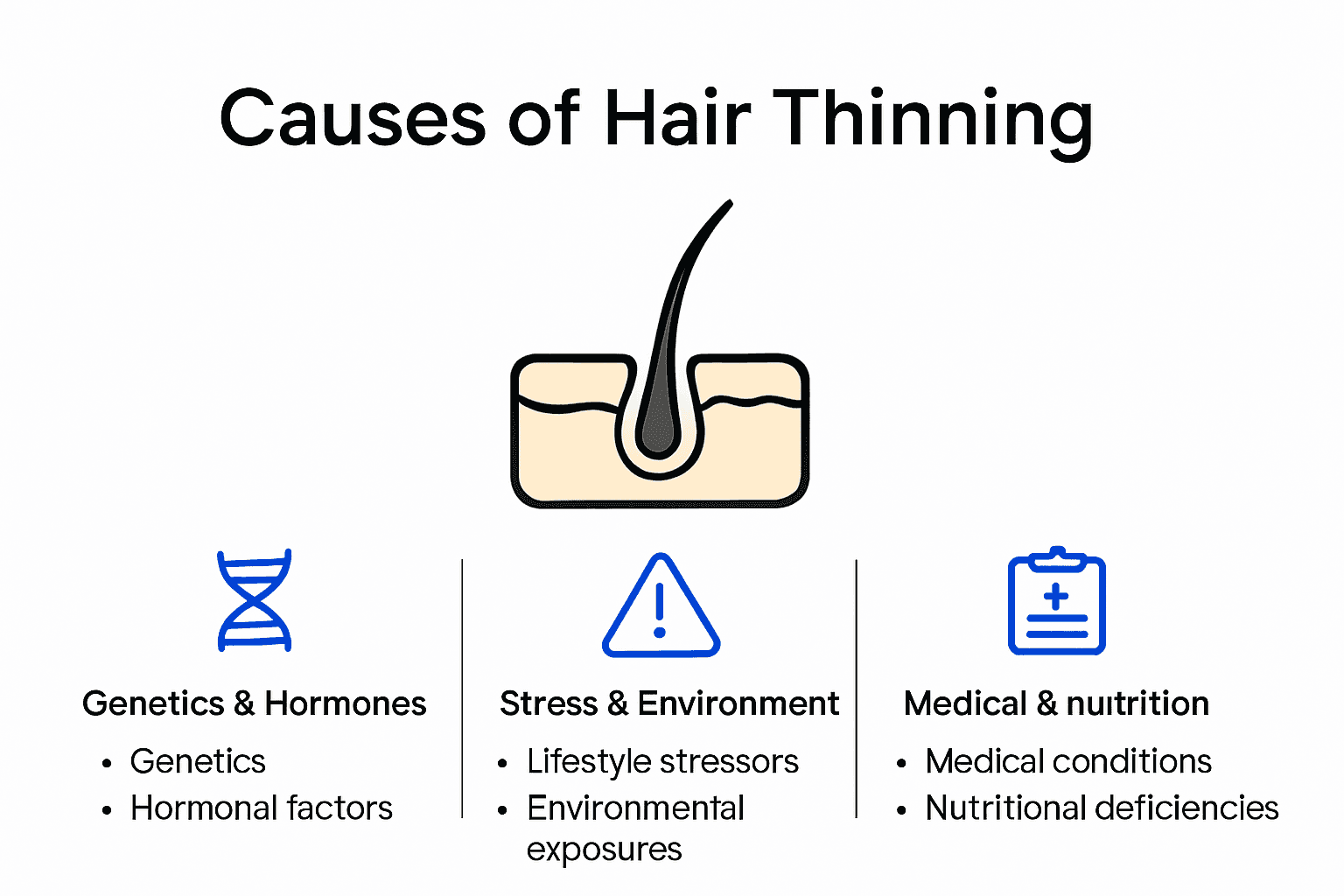Blog
Learning Materials
How to Get Thicker Hair: Proven Tips for Fuller Locks in 2025
Updated: June 15, 2025

Everyone wants thicker hair, and for good reason. Nearly 80 million Americans experience hereditary hair thinning or loss at some point. Shockingly, most people focus only on shampoos and quick-fix serums. What actually unlocks fuller hair is a blend of nutrition, science, and smarter tracking you probably haven’t tried yet.
Table of Contents
- Understanding Causes Of Thinning Hair
- Best Natural And Medical Solutions
- Personalized Routines To Get Thicker Hair
- How To Track Hair Growth Progress
Quick Summary
| Takeaway | Explanation |
|---|---|
| Understand the Causes of Thinning Hair | Recognize that hair thinning can stem from genetic factors, hormonal changes, lifestyle stressors, medical conditions, and nutritional deficiencies, which all require tailored strategies to combat. |
| Explore Natural and Medical Solutions | Utilize natural treatments like herbal remedies and oils, along with medical options such as minoxidil and finasteride, to enhance hair thickness effectively. |
| Adopt Personalized Hair Care Routines | Embrace individualized strategies supported by advanced diagnostics, comprehensive health assessments, and ongoing monitoring to address specific hair health needs. |
| Track Hair Growth Progress | Implement systematic tracking through photography and scientific measurement techniques to monitor hair growth and adapt strategies as needed. |
Understanding Causes of Thinning Hair

Understanding why hair becomes thinner is crucial for developing effective strategies to get thicker hair. Hair loss and thinning are complex conditions influenced by multiple interconnected factors that can impact hair growth and overall hair health.
Genetic Factors and Hormonal Influences
Androgenetic alopecia, commonly known as hereditary pattern baldness, represents the most significant genetic contributor to hair thinning. According to research from the National Center on Aging, this condition affects millions of people worldwide, creating predictable patterns of hair loss in both men and women. Hormonal changes play a critical role in this process. Dihydrotestosterone (DHT), a derivative of testosterone, can shrink hair follicles and progressively reduce hair density. For women, hormonal shifts during pregnancy, menopause, and thyroid disorders can dramatically impact hair thickness and growth cycles.
Lifestyle and Environmental Stressors
Modern lifestyle factors have emerged as significant contributors to hair thinning. Research published in the Journal of Drugs in Dermatology highlights how chronic stress elevates cortisol levels, directly disrupting the hair growth cycle. When stress pushes more hair follicles into the telogen (resting) phase, increased shedding occurs. Environmental factors such as pollution, UV radiation, and harsh chemical treatments can further compromise hair health. Nutrient-poor diets lacking essential proteins, vitamins, and minerals significantly impact hair growth potential.
Medical Conditions and Nutritional Deficiencies
Underlying medical conditions can trigger unexpected hair thinning. Autoimmune disorders like alopecia areata cause the immune system to attack hair follicles, leading to patchy hair loss. Conditions such as thyroid disorders, scalp infections, and nutritional deficiencies in iron, vitamin D, and B complex vitamins can substantially reduce hair density. Certain medications for blood pressure, depression, and cancer treatments may also contribute to hair loss as a side effect. Understanding these potential triggers allows individuals to work proactively with healthcare professionals to address the root causes of hair thinning and develop personalized strategies to promote healthier, thicker hair growth.
By recognizing the multifaceted nature of hair thinning, you can take informed steps toward maintaining and improving your hair's health and appearance.
Best Natural and Medical Solutions
Navigating the world of hair thickening solutions requires understanding both natural remedies and medical interventions that can effectively help you get thicker hair. The right approach combines multiple strategies targeting hair health from different angles.
Natural Herbal and Oil Treatments
Natural solutions offer powerful alternatives for improving hair thickness without invasive procedures. A 2016 medical study demonstrated that regular scalp massage can significantly increase hair thickness over 24 weeks. Complementing massage techniques, specific herbal treatments have shown remarkable results. Bhringaraj, an Ayurvedic herb, stands out for its ability to strengthen hair roots and support healthy follicle function. Rich in nutrients and antioxidants, this traditional remedy helps revitalize thinning hair. Another potent natural solution is castor oil, which contains high ricinoleic acid content. Research indicates that castor oil improves scalp health, increases blood circulation, and creates a protective hydrating layer on hair strands, ultimately enhancing hair density and preventing breakage.

Medical and Clinical Interventions
For individuals experiencing more advanced hair thinning, medical solutions provide targeted interventions. Minoxidil, an FDA-approved topical treatment, stimulates hair follicles and promotes growth by extending the hair growth phase. Finasteride, an oral medication, works by blocking DHT production, which can slow down or prevent further hair loss. Advanced treatments like platelet-rich plasma (PRP) therapy utilize the patient's own blood components to stimulate hair growth. During this procedure, concentrated platelets are injected into the scalp, releasing growth factors that can potentially reactivate dormant hair follicles. Newer technologies such as low-level laser therapy offer non-invasive options that may improve hair thickness by stimulating cellular activity and blood flow in the scalp.
Nutritional and Supplemental Approaches
A holistic approach to getting thicker hair involves addressing nutritional deficiencies that can contribute to hair thinning. Specific supplements can provide targeted nutritional support for hair health. Biotin, a B-vitamin, plays a crucial role in keratin production, the protein that forms hair structure. Supplements containing zinc, iron, and vitamin D can help address nutritional gaps that might impede hair growth. Collagen peptides have gained popularity for their potential to support hair strength and elasticity. Omega-3 fatty acids, found in fish oil supplements, can improve scalp health and reduce inflammation that might interfere with hair growth. Professional consultation with a dermatologist or trichologist can help develop a personalized supplementation strategy tailored to individual nutritional needs and hair health goals.
By combining natural remedies, medical interventions, and nutritional support, you can create a comprehensive strategy to promote thicker, healthier hair.
Personalized Routines to Get Thicker Hair
Traditional one-size-fits-all hair care approaches are becoming obsolete. Modern hair growth strategies now focus on precision and individualization, recognizing that each person's hair health journey is unique.
Advanced Diagnostic Technologies
Personalized hair growth routines in 2025 leverage cutting-edge diagnostic technologies to create custom strategies. Clinical research demonstrates that AI-driven treatments combining tailored shampoos, topical serums, nutraceuticals, and supplements can significantly improve hair growth and scalp health. Advanced diagnostic tools now include scalp mapping, stem cell analysis, exosome tracking, and genetic predisposition evaluation. These technologies allow for unprecedented insight into individual hair loss patterns, enabling practitioners to design interventions that address specific physiological needs.
Comprehensive Health Assessment
Successful personalized hair routines require holistic evaluation beyond surface-level analysis. Emerging research highlights the importance of comprehensive health assessments that incorporate genetic testing, scalp microbiome evaluation, nutritional profiling, and hormonal balance checks. This multifaceted approach ensures that interventions are precisely calibrated to an individual's unique biological landscape. Factors such as stress levels, metabolic health, nutritional intake, and hormonal fluctuations are meticulously analyzed to develop a dynamic hair care strategy that adapts to changing physiological conditions.
Ongoing Monitoring and Adaptation
The future of hair thickness management lies in continuous tracking and responsive adjustment. Modern personalized routines are not static but evolve with an individual's changing health profile. Sophisticated monitoring systems can track hair density, follicle health, and growth patterns in real-time, allowing for immediate intervention and strategy refinement. Wearable technologies and advanced scanning techniques provide granular data about hair and scalp conditions, enabling users to understand their hair health at an unprecedented level of detail. By embracing this proactive and personalized approach, individuals can develop targeted strategies that not only address current hair thinning but also prevent future hair loss.
Your journey to thicker hair is no longer about generic solutions but a precisely crafted, scientifically backed personal roadmap to optimal hair health.
How to Track Hair Growth Progress
Tracking hair growth progress is essential for understanding the effectiveness of your hair thickening strategies and maintaining motivation throughout your hair health journey. Modern techniques offer precise and accessible methods to monitor your hair's transformation.
Photography and Visual Documentation
Research demonstrates that consistently documenting hair growth requires standardized monthly photographs taken from identical angles and under uniform lighting conditions. These images serve as a critical visual record of subtle changes often imperceptible in day-to-day observations. Professional tracking involves establishing fixed reference points on the scalp, using specific markers or landmarks that remain consistent across photographs. Strategic photo documentation enables individuals to compare hair density, length, and overall appearance objectively. Digital tools and smartphone applications now provide advanced features like overlay comparisons and precise measurement tracking, making visual progress monitoring more sophisticated and user-friendly.
Measurement and Scientific Tracking Methods
Scientific studies reveal non-invasive techniques for measuring precise hair growth rates. Advanced methods include specialized clipping techniques and precise imaging technologies that can track hair length changes as minute as 125 micrometers per day. Professional tracking involves using calibrated rulers, digital calipers, and high-resolution imaging to document millimeter-level changes. Some emerging technologies utilize microscopic analysis to assess not just length but also hair shaft diameter, follicle health, and growth patterns. These scientific approaches provide quantitative data beyond subjective visual assessments, offering a comprehensive understanding of hair growth dynamics.
Digital and Technological Monitoring Solutions
Technology has revolutionized hair growth tracking, introducing sophisticated digital monitoring solutions. Smart scalp scanners and AI-powered applications can now perform detailed hair and scalp analyses, generating comprehensive reports about hair health. These technologies provide metrics including hair density, follicle count, breakage rates, and growth velocity. Wearable devices and smartphone applications enable users to log nutritional intake, stress levels, and other factors potentially influencing hair growth. Some advanced platforms offer predictive modeling, using collected data to forecast potential hair growth trajectories and recommend personalized interventions. By integrating multiple data points, these digital solutions transform hair growth tracking from a passive observation to an active, data-driven management strategy.
Consistent, methodical tracking transforms your hair growth journey from a hope-based approach to a scientifically informed progression toward thicker, healthier hair.
Frequently Asked Questions
What are the main causes of thinning hair?
Thinning hair can be caused by genetic factors, hormonal changes, lifestyle stressors, medical conditions, and nutritional deficiencies. Understanding these causes helps in developing a customized approach to improve hair thickness.
What natural treatments can help with thicker hair?
Natural treatments like scalp massage, herbal remedies such as Bhringaraj, and oils like castor oil can effectively promote thicker hair by improving scalp health and enhancing hair density.
What medical options are available for hair thinning?
Medical options include FDA-approved treatments like minoxidil and finasteride, as well as advanced therapies like platelet-rich plasma (PRP) therapy and low-level laser therapy, which stimulate hair follicles and promote growth.
How can I effectively track my hair growth progress?
You can track hair growth by taking standardized photographs, using specialized measurement techniques to assess length and thickness, and utilizing digital monitoring solutions that analyze scalp health and growth metrics.
Ready to Take Control of Thinning Hair?
If you are feeling frustrated by slow progress or unsure which tip actually works for your unique hair, you are not alone. The article explored how genetics, stress, nutrition, and daily routines all impact your hair thickness. But finding out what truly triggers thinning for you and tracking real improvement can feel impossible with standard approaches.

This is where MyHair.ai can empower you. With AI-driven hair health analysis and easy scan uploads, discover exactly what is affecting your hair growth and which personalized actions will move you closer to fuller locks. Get tailored product suggestions and see your results with visual progress tracking. Do not wait for change to happen by chance—visit MyHair.ai today and start your journey to noticeably thicker hair with smart technology on your side.